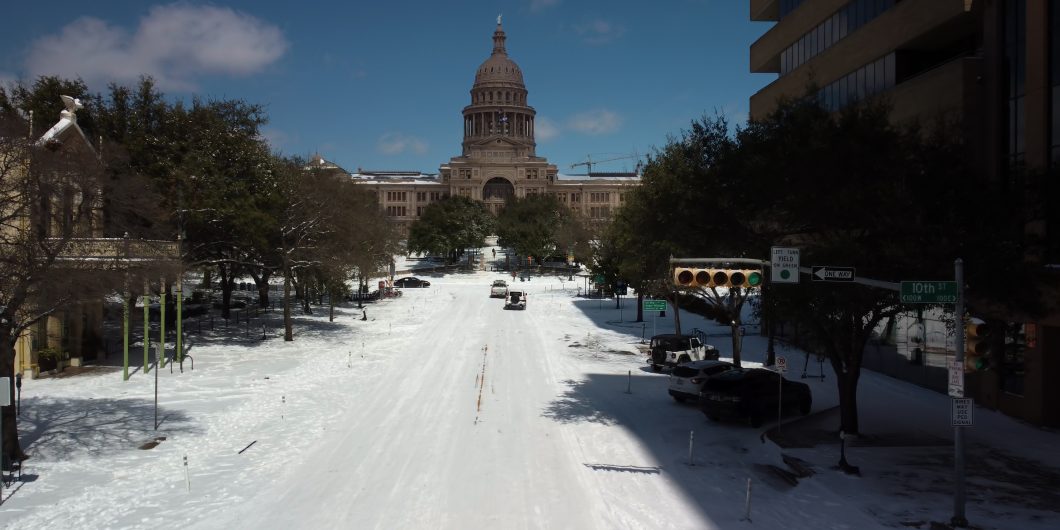The SEC's potential climate-risk disclosure requirement would be redundant, unhelpful, and may be outside its authority.
The Wrath of Gaia
There is a natural tendency among human beings to attribute major physical as well as personal events to divine interventions in the order of things. Rationalist philosophers long aimed to eliminate this tendency when it comes to astronomical, climatological, or geological events by uncovering their natural causes. The ancient Greek philosopher Thales is credited with being the first thinker to predict a solar eclipse, showing that it was a natural event, not a sign that the gods were angry with human beings. In modern times, Montaigne, urging that children be given a more cosmopolitan education than was customary, remarked in the 1580 edition of his Essays, “When the vines freeze in my village [in France’s famed wine-producing region of Bordeaux], my priest infers that the wrath of God is upon the human race,” oblivious to the possibility that at the same time “ten thousand parts of the world [were] having a gay time.” Later, the devastating Lisbon earthquake of 1755, in which some 50,000 lost their lives, occurring as it did on the major Catholic holiday of All Saints’ Day, caused significant theological tremors, causing some to doubt the possibility of divine Providence, and others to believe that the quake was a sign of His wrath at our enormous sins.
Attributing climatic events to divine sources is no longer in fashion, at least in the Western world. Hence the prominent faith-healing evangelist Pat Robertson elicited widespread mockery when he credited his prayers with diverting the power of Hurricane Gloria in 1985 away from his headquarters in Virginia Beach (and instead in the direction of the Middle Atlantic and northeastern states, where it wrought most of its considerable damage). We twenty-first century humans have transcended such superstitions. Or have we?
Following a blast of frigid Arctic air over much of the United States on February 15 and 16 of this year, causing not only widespread discomfort but real suffering in large swaths of central and southern areas (with millions left without power, thanks in part to the failure in states like Texas of electrical grids that relied on “green” energy sources), the New York Times lead story for February 17 featured the paper’s customary explanation for such events: the big chill was the result of global warming!
You read that right. “While scientists are still analyzing what role human-caused climate change may have played” in the storms, the event makes it “clear” according to the Times reporter “that global warming poses a barrage of additional threats to power systems nationwide, including fiercer heat waves and water shortages.” As the story explains, according to “experts,” “unless grid planners start planning for increasingly wild and unpredictable climate conditions,” grid failures such as occurred in Texas “will happen again and again.”
Decades ago, in the early years of the spread of the global-warming hypothesis, whenever an unusual cold snap hit, proponents of the hypothesis were careful to distinguish between “weather” and “climate.” Variable “weather” events, from single-digit temperatures to hurricanes (seemingly belying the “water shortages” also forecast in the Times story), were dismissed as of no lasting significance: after all, inhabitants of various cities I’ve lived in like to say, “if you don’t like the weather today, just wait until tomorrow.”
Now, however, as Times reporters and editorialists along with their sympathizers deepen their fervor, they are much less careful to make such distinctions. If current weather doesn’t conform to your overall prophecy, just turn things around to show that it really vindicates your claims—much as medieval theologians, or twentieth-century horoscope columnists, once twisted themselves in knots to show how events that seemingly belied their prophecies really confirmed them. This is what true scientists call a non-falsifiable hypothesis: heads I win, tails you lose. Hence the Times cites unnamed “analysts” who speculate “that global warming could, paradoxically, bring more unusually fierce winter storms,” as Arctic warming causes changes in the jet stream that “allow cold air to periodically escape to the South,” resulting in unusual “episodes of bitter cold.”
The issue here is not whether anthropogenic carbon dioxide emissions might affect ocean-currents in ways that move the jet stream. That could be verified. But it is non-falsifiable to say that global-warming is itself evident in events that empirically constitute contributions to potential net global-cooling.
This column is not the place to review the evidence on what caused the sudden cold front in a place like Texas. In brief, the Times story suggests (not surprisingly, given the paper’s ideological bent) that the blame might lie with the state’s deregulation of its electricity system in the 1990s, no longer requiring energy producers “to hold a fixed number of backup power plants in reserve.” By contrast, a Wall Street Journal editorial published February 16 explained that power outages resulted from the freezing of wind turbines, on which Texas increasingly relies (at the behest of the green-energy lobby) for generating electricity (including for home heating). At the same time, as Journal columnist Holman Jenkins observed the following day, cutbacks on coal-fired plants, and the failure to build new nuclear ones, increased the state’s vulnerability to a sudden power shortage, since gas-fired plants (favored for their lower omissions), unlike coal- or nuclear-powered ones, lack an immediate backup supply. These are not, of course, the sorts of explanation to which Times reporters and editorialists are inclined to give much consideration.
My focus here is instead on the quasi-religious ideology underlying the non-falsifiable global-warming hysteria. Some serious climate scientists, such as Fred Singer, an atmospheric physicist at George Mason University and founder of the Science and Environmental Policy Project, point out that the supposed scientific “consensus” on the threat of warming—its existence, its likely rate of increase (if any) and consequent effects—is based on computer models more than on reliable empirical data, and argue that future warming will be inconsequential or modest at most. Bjorn Lomborg, the self-described “skeptical environmentalist” who heads the Copenhagen Consensus Center, acknowledges the likelihood of (moderately) increased global temperatures by the end of the 21st century, but challenges alarmist prophecies, and argues that instead of spending vast sums of money, diverted from real economic growth, towards eliminating fossil fuels and going “carbon neutral,” we should focus climate-change expenditures on further research, designed not only to assess its effects more precisely, but to find ways of adapting in the least costly or intrusive ways.
But such arguments will elicit only scorn from writers like journalist David Wallace-Wells, author of The Unhabitable Earth: Life after Warming, a 2019 Times bestseller that was made mandatory reading that year for freshmen entering the college where I teach. The book grew out of a 2017 article in New York magazine, said to have been the most widely-read piece in the magazine’s history. The article began with the warning that “[i]f your anxiety about global warming is dominated by fears of sea level rise, you are barely scratching the surface of what terrors are possible.” While the article elicited numerous criticisms from the global-warming community for various factual errors and rhetorical exaggerations, Wallace-Wells subsequently defended his approach by explaining “it didn’t seem plausible to me that there was more risk at scaring people too much than there was at not scaring them enough … my feeling was, and is, if there’s a one percent chance that we’ve set off a chain reaction that could end the human race, then that should be something that the public knows and thinks about.” The harms caused to human well-being by taking excessive “precautions” to avert a one percent (or less) risk of supposed global disaster apparently didn’t enter his calculations, as they do those of Lomborg and other mainstream scientists.
Pantheism is a doctrine whose effects are evil, in Tocqueville’s judgment, because they exacerbate the already-too-natural tendency in a modern democracy to erase the distinctions not only among increasingly homogeneous individuals, but between human beings and the rest of Creation.
If anything, Wallace-Wells’s book was even more alarming, or alarmist, than his article. As a sympathetic reviewer in The Guardian observed, after the article “frightened the life out of everyone who read it,” in the book Wallace-Wells “is even more remorseless in his delineation of what the not nearly distant enough future probably holds for us. The book’s longest section, entitled “Elements of Chaos”, is composed of 12 short and brutal chapters, each of which foretells a specific dimension of our forecast doom, and whose titles alone – Heat Death; Dying Oceans; Unbreathable Air; Plagues of Warming—are enough to induce an honest-to-God panic attack.” Indeed, to a Jewish reader, at least, this parade of horribles is reminiscent of the Biblical Ten Plagues imposed against Pharaoh, which we recite each year at our Passover Seder, to remind us both of God’s power and of His mercy. But how far is Wallace-Wells, a journalist rather than a scientist, an admittedly error-prone writer, and a professed alarmist, entitled to such awe or credibility?
I believe that the underlying ground of the appeal of books like The Uninhabitable Earth in modern, democratic, supposedly rationalistic societies like America was identified by Alexis de Tocqueville in the second volume of his great Democracy in America. In Chapter 7 of Part I of that volume, “What Makes the Mind of Democratic Peoples Lean Toward Pantheism,” Tocqueville acknowledges “the great progress” that pantheism, the view that the universe itself is divine, has made in his time. Tocqueville explains this progress by observing that as social conditions “become more equal and each man… becomes” more like his fellows, “one forgets individuals so as to think only of the species.” In those times, people become obsessed by “the idea of unity,” seeking to enclose even “God and the universe within a single whole.” At this point, the normally sober Tocqueville issues an unusually harsh dictum: since among the various philosophic systems that seek to explain the universe, pantheism “appears … one of the most appropriate to seduce the human mind in democratic centuries, all who remain enamored of the genuine greatness of man should unite and do combat against it.” (Trans. Mansfield and Winthrop; emphasis added.)
Pantheism is a doctrine whose effects are evil, in Tocqueville’s judgment, because they exacerbate the already-too-natural tendency in a modern democracy to erase the distinctions not only among increasingly homogeneous individuals, but between human beings and the rest of Creation, and the notion of a divine spark that above all sets us apart from (and higher than) other parts of the given universe. It threatens to stamp out human individuality, freedom, and the aspiration to greatness.
The popularity of climate panic on college campuses today harmonizes with that of books like The World without Us (2007), in which another American journalist, Alan Weisman, speculates on how the earth might change if the human race gradually disappears. He concludes by recommending reconsideration of the ”one-child policy” infamously pioneered by the Chinese Communist government (which forced mothers who already had a child to abort any subsequent fetuses), admitting that while the policy of mandatory birth limitation is a “draconian measure,” “The bottom line is that any species that overstretches its resource base suffers a population crash. Limiting our reproduction would be damn hard, but limiting our consumptive instincts may be even harder.”
As others have remarked, global-warming fanaticism of the sort that now pervades our campuses, media outlets, and some Democratic party cliques is a new secular religion. It has its own priesthood (supposedly rationalistic intellectuals), its own rituals (driving electric cars), and its own fear-inspiring deity (the earth itself). And its secular clergy feel no less free than their theological predecessors to condemn our natural instincts such as consumption and reproduction, in the name of our supposed salvation as they conceive it.
Those who really care about the future of the world, but especially about man’s place in it, will do better to weigh the advice of sober-minded scientists, economists, and responsible politicians who recognize the necessity of assessing the likelihood and severity of possible future evils against present needs, rather than fear-mongers who seek absolute authority over our lives, and ultimately our souls. And they will abstain from the rush to blame every uncomfortable climate event on the wrath of Gaia.


